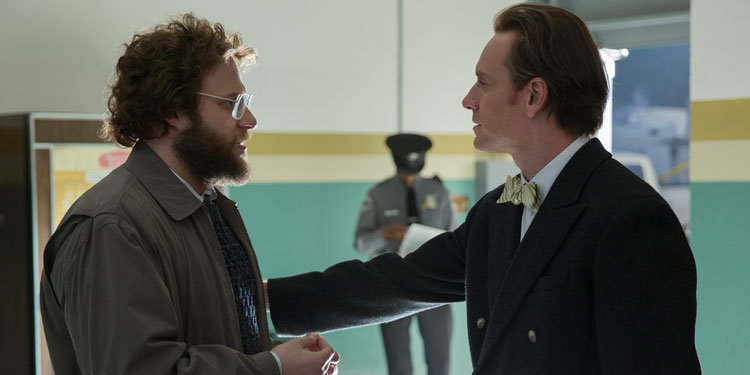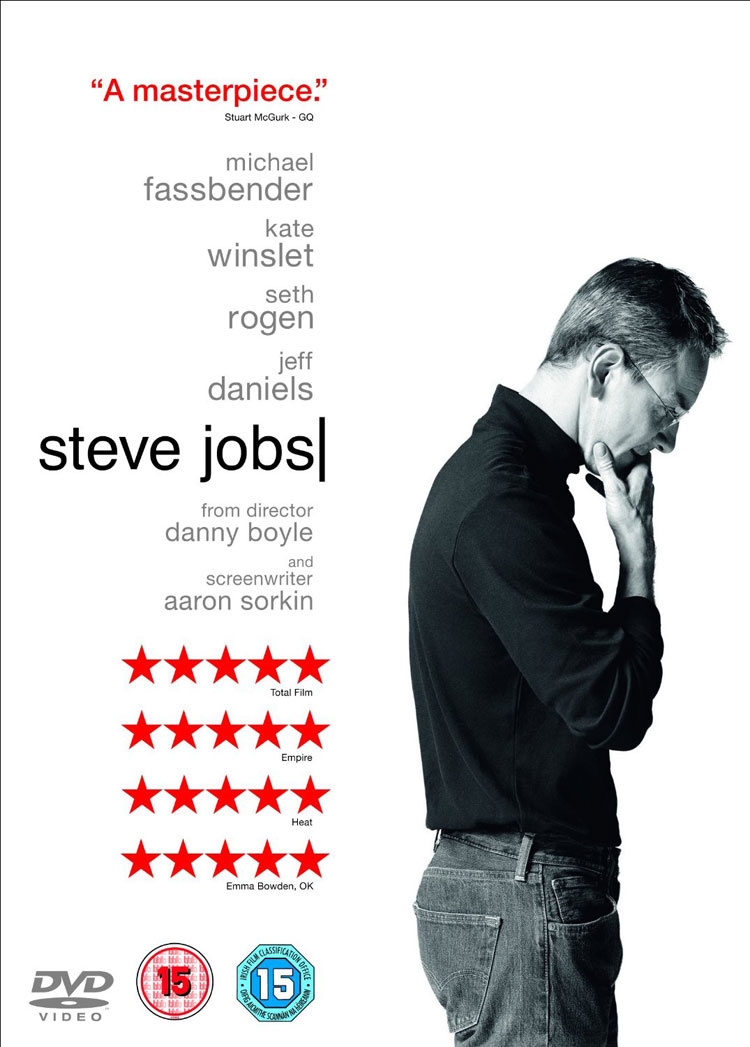
Director: Danny Boyle
Running Time: 122 mins
Certificate: 15
Release Date: March 21st 2016 (UK)

I’m starting to think that screenwriter Aaron Sorkin has decided he’s a complete prick, and so has set out to write things that suggest that being the best and being an ass go hand-in-hand. The likes of The Social Network, Steve Jobs and, to some extent, The Newsroom and Studio 60 On Sunset Strip have all forwarded this agenda. Rumours suggest Sorkin can be incredibly demanding and difficult to work with (stories of how tough it was in the writer’s room of The West Wing and how little he listened to other peoples’ ideas are legendary), and it’s oddly interesting how so many of his projects seem to be about his own issues with this.
What he never quite addresses though is something he puts in the mouth of Apple co-founder Steve Wozniak in Steven Jobs, who tells the demanding and difficult Steve that being talented and being a decent person are not mutually exclusive. However, in the world of Aaron Sorkin, it often feels like they are.
The annoying thing about Sorkin is the same thing as the with likes of the real-life Steve Jobs and Mark Zuckerberg – if they weren’t so genuinely talented, they wouldn’t be able to get away with it and they would just be seen as arrogant and unpleasant. So does the arrogance and difficult personality help make them great, or does the greatness allow them to get away with being difficult and give them a free pass for it they shouldn’t really get?
That said, there are some who really don’t like Sorkin’s incredibly wordy, quickfire dialogue and find him a pretentious bore, and if you’re one of those, Steve Jobs will do nothing to change your mind – but if you do appreciate it, it’s a bit of a tour de force.
Rather than being a traditional cradle-to-grave biopic, the movie focuses almost entirely on the moments leading up to Jobs’ product launch speeches for the Apple Mac in 1984, the NeXT in 1988 and the iMac in 1998. It introduces us to a very difficult man who always thinks he’s right, even when it seems he’s being very publicly shown he’s wrong. Indeed, the movie loves the metaphor of the Mac being a closed architecture where Apple essentially gets to tell you what you can and can’t do with it, and the fixed, uncompromising and harsh ideas of Jobs.
The script gives each product launch the same rhythms, so we get to see his evolving relationship with the likes of his assistant, Joanna Hoffman (a brilliant Kate Winslet), who in the film is essentially his Jiminy Cricket, trying to give him the conscience he often appears to lack. There’s also Steve Wozniak, who heads the Apple 2, which in the early days was the company’s only successful product while the original Mac bombed, Apple CEO John Sculley (Jeff Daniels), who was in charge at the point Apple fired Jobs in the 80s before he eventually returned, and perhaps most importantly, Jobs’ daughter, Lisa.
It with his relationship with his daughter that the movie attempts to find some real humanity in Steve, moving from his semi-denial of paternity in the early days to a possible understanding by the time she’s in her late teens.
Initially it’s uncertain whether the movie will be able to pull it off. For the first half-hour Jobs is portrayed as so horrifically unlikeable that you begin to feel that even if he’d single-handed saved the human race from a zombie apocalypse, you wouldn’t want to watch a movie about him. However, it comes to life thanks to some truly brilliant performances – if it weren’t for DiCaprio, there’s a good chance Michael Fassbender would have nabbed the Best Actor Oscar – and Danny Boyle’s kinetic direction, which helps ensure that something that could have seemed rather static feels genuinely cinematic. And of course there’s Sorkin’s rapid-fire and complexly layered words.
In fact, the moves along so fast and with so much to think about – and thankfully with a bit of a sense of humour – that you don’t really notice that in order to pull off being solely set at product launches while simultaneously trying to get us inside Jobs’ head, the whole thing is by necessity pretty contrived. That doesn’t matter though, because it works.
Does it get you to fully understand who Steve Jobs was? Not really, as the film seems to accept that the man was an enigma, while skirting around the issue of whether he was a genius, or whether he was largely a man of vision whose greatest talent was in presenting things to the world (while simultaneously making it seem like he’d created it single-handed). What it does exceptionally well is to probe Steve and his psyche, while leaving it open as to whether he was a man or monster. Sorkin definitely seems to want us to forgive unconscionably difficult people if they have a worthwhile vision, but he’s not so myopic as not present us with other possibilities and ideas here.
His script, coupled with plenty of other incredibly talented people involved in the movie ensure what could have seemed staid and far too pleased with itself is dynamic and fascinating to watch.
Overall Verdict: I’m still not sure what to think about Steve Jobs the man, but Steve Jobs the movie is a great watch.
Reviewer: Tim Isaac
Leave a Reply (if comment does not appear immediately, it may have been held for moderation)